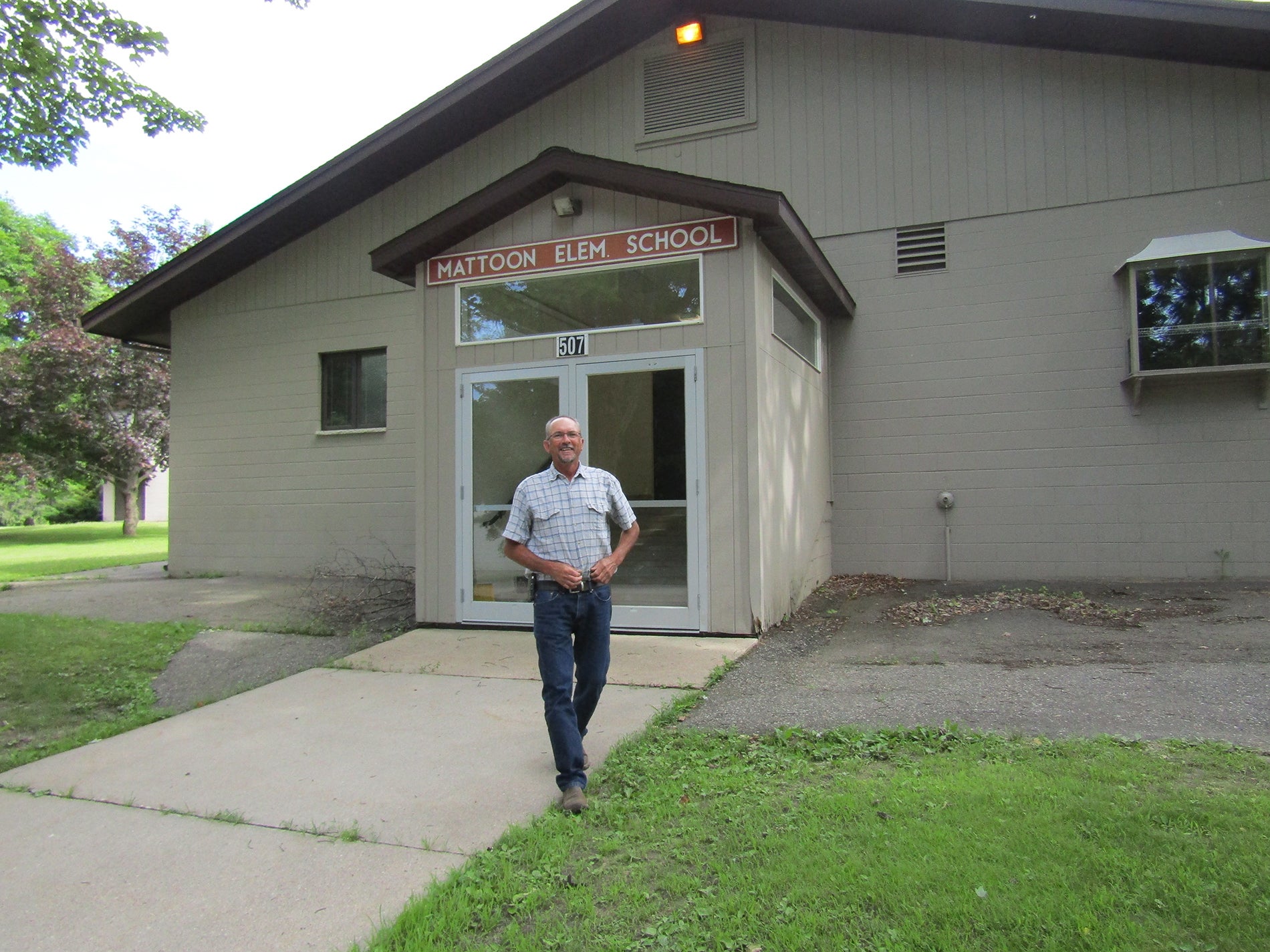The village of Mattoon built its first school in 1898. It sat right on the 45th parallel, splitting the difference between the equator and the North Pole. The buildings changed, but until 2016, children went to school in pretty much the same spot.
Now, the building that was Mattoon Elementary School sits vacant and unused. And during the school year, children from the village of about 418 people are bused to Antigo, some 45 minutes away.
Wade Riemer visits the old school often. The building is in good shape, all things considered. A portion of it was built in the 1940s and the district added a gymnasium in the ’70s. Not long before they closed it, the Unified School District of Antigo put a new roof on it.
Stay informed on the latest news
Sign up for WPR’s email newsletter.
But it’s a quiet place now, and Riemer hates that.
“You don’t hear the cars pulling up here, the people getting their kids, the kids running around, the little kid riding his bike home from school,” he said. “Those sounds are gone. When those bells left … everything else left, too.”
Riemer has plans to turn the school into a community center and a Christian private school. Riemer, 56, founded a nonprofit called Shepherd’s Watch with money that he made when he sold his beef farm in 2017. He wants to use that money for mission work. And he wants to see — and to hear — the school in use again.
Instead, he and his village are locked in a bitter court battle with the Antigo school district over who owns the building and what it might become. It’s a conflict with potential ripple effects in rural school districts across Wisconsin, and one that speaks to the way declining populations in rural areas can lead to battles over the best uses of public spaces and public funds.
[[{“fid”:”1010891″,”view_mode”:”full_width”,”fields”:{“format”:”full_width”,”alignment”:””,”field_image_caption[und][0][value]”:”%3Cp%3EMattoon%20Elementary%20School%20closed%20in%202016%20after%20several%20efforts%20to%20raise%20revenue%20by%20referendum%20failed%20in%20the%20Unified%20School%20District%20of%20Antigo.%20%3Cem%3ERob%20Mentzer%2FWPR%3C%2Fem%3E%3C%2Fp%3E%0A”,”field_image_caption[und][0][format]”:”full_html”,”field_file_image_alt_text[und][0][value]”:”Mattoon Elementary School”,”field_file_image_title_text[und][0][value]”:”Mattoon Elementary School”},”type”:”media”,”field_deltas”:{“1”:{“format”:”full_width”,”alignment”:””,”field_image_caption[und][0][value]”:”%3Cp%3EMattoon%20Elementary%20School%20closed%20in%202016%20after%20several%20efforts%20to%20raise%20revenue%20by%20referendum%20failed%20in%20the%20Unified%20School%20District%20of%20Antigo.%20%3Cem%3ERob%20Mentzer%2FWPR%3C%2Fem%3E%3C%2Fp%3E%0A”,”field_image_caption[und][0][format]”:”full_html”,”field_file_image_alt_text[und][0][value]”:”Mattoon Elementary School”,”field_file_image_title_text[und][0][value]”:”Mattoon Elementary School”}},”link_text”:false,”attributes”:{“alt”:”Mattoon Elementary School”,”title”:”Mattoon Elementary School”,”class”:”media-element file-full-width”,”data-delta”:”1″}}]]
After Antigo Sought To Restrict Building’s Use, Mattoon Questioned Ownership
Riemer was born in Milwaukee, where his dad worked at A.O. Smith Corp. manufacturing car frames. Both of his parents were from northern Wisconsin and when Riemer was 12, the family moved back north to the country outside Mattoon. Riemer, trim with gray hair and the tanned skin of a man who works outside, has been an electrician and a carpenter in addition to working the farm.
Riemer was out tapping maple trees, he said, when the idea hit him.
“I know the struggles they had with the school and I could see at that point that things just weren’t going anywhere,” he said. “All the sudden, the light came on to me: this Mattoon school. (This could be a) great place to do some mission work.”
For the Shepherd’s Watch community center, Riemer envisions a thrift shop and a cafe, a Christmas program and a computer lab. He also wants to open a school and use funding from Wisconsin’s statewide school voucher program to allow enrollment of Mattoon children whose parents want that kind of education. He’s openly skeptical of the values that are taught in public schools and worries about what he sees as the liberal drift of American culture.
Antigo officials agreed to sell the building to the village of Mattoon for $1. The village, in turn, would sell it to Shepherd’s Watch. But Antigo insisted on a restriction: The community center and nonprofit plans were fine, but under no circumstances could the building be used as a school.
“They wanted me to commit to that deed restriction,” Riemer said. “I just couldn’t do it. It was very difficult to do.”
But he thought about it, and prayed about it, and decided to move forward.
“We can’t let this hold us up,” he said he thought at the time. “We’ll battle that deed restriction down the road.”
As the sale was being finalized, though, Mattoon officials found something surprising: The Unified School District of Antigo didn’t possess the deed for the school. The district had taken over what had been the Mattoon School District back in the ’60s, and had operated the school ever since. But with no deed, it raised the question of whether the district actually took legal possession of the building or not.
And if the building belongs to the village of Mattoon, then the village would be free to sell it to Riemer and Shepherd’s Watch with no restrictions. Then the private school could be part of the plans again.
That’s the subject of the lawsuit between Mattoon and the Antigo district. A court will decide who owns the building — and that decision may essentially determine what the vacant school can become.
Outcome Of Conflict Could Be Felt In Other Rural Districts
The story of how Antigo reached the decision to close this school is contested.
Why pay to put a new roof on the school, more than one resident asked, only to turn around and close it?
But its arc is familiar to many rural districts in Wisconsin, where declining student populations and state budget cuts have left districts with overstretched budgets.
Start with the population: When Mattoon built its first school at the end of the 19th century, there were about 1,800 people in the little town, more than four times today’s population. And the population who lives there is aging. There aren’t many young families moving in.
“I want to see this community succeed,” said Zak Kickhaver, 33, who works as the village superintendent. “I want to see the younger generation succeed. And quite frankly right now, that worries me, where that’s going.”
[[{“fid”:”1010896″,”view_mode”:”full_width”,”fields”:{“alt”:”Zak Kickhaver”,”title”:”Zak Kickhaver”,”class”:”media-element file-full”,”data-delta”:”2″,”format”:”full_width”,”alignment”:””,”field_image_caption[und][0][value]”:”%3Cp%3EZak%20Kickhaver%2C%20superintendent%20of%20the%20village%20of%20Mattoon%2C%20hopes%20to%20send%20his%20young%20kids%20to%20school%20at%20the%20Mattoon%20Elementary%20school%20building.%20%3Cem%3ERob%20Mentzer%2FWPR%3C%2Fem%3E%3C%2Fp%3E%0A”,”field_image_caption[und][0][format]”:”full_html”,”field_file_image_alt_text[und][0][value]”:”Zak Kickhaver”,”field_file_image_title_text[und][0][value]”:”Zak Kickhaver”},”type”:”media”,”field_deltas”:{“2”:{“alt”:”Zak Kickhaver”,”title”:”Zak Kickhaver”,”class”:”media-element file-full”,”data-delta”:”2″,”format”:”full_width”,”alignment”:””,”field_image_caption[und][0][value]”:”%3Cp%3EZak%20Kickhaver%2C%20superintendent%20of%20the%20village%20of%20Mattoon%2C%20hopes%20to%20send%20his%20young%20kids%20to%20school%20at%20the%20Mattoon%20Elementary%20school%20building.%20%3Cem%3ERob%20Mentzer%2FWPR%3C%2Fem%3E%3C%2Fp%3E%0A”,”field_image_caption[und][0][format]”:”full_html”,”field_file_image_alt_text[und][0][value]”:”Zak Kickhaver”,”field_file_image_title_text[und][0][value]”:”Zak Kickhaver”}},”link_text”:false,”attributes”:{“alt”:”Zak Kickhaver”,”title”:”Zak Kickhaver”,”class”:”media-element file-full-width”,”data-delta”:”2″}}]]
It’s not just Mattoon. Rural schools in Wisconsin have been in decline for years.
According to data from the state Department of Public Instruction, since 2011, 71 schools in rural areas have been closed. Forty of those were elementary schools. Antigo itself last month closed three rural schools as the district faces continued financial pressure.
In some places, vacated school buildings have been turned into senior housing or technical education centers. In others, old schools are left to decay.
In the Antigo district, financial problems were compounded when voters declined to approve tax increases in 2011, 2012 and 2016 that would have brought in new revenue for school facilities. It was shortly after the failed referendum in 2016 that Mattoon parents received notice from the district that the school would close.
“With shrinking budgets out in our rural areas especially, administrators have had to make tough decisions,” said Kim Kaukl, executive director of the Wisconsin Rural Schools Alliance.
For some parents and community members, maintaining school buildings — keeping elementary schools open — is the priority. But Kaukl said many education experts say it’s better for students to protect school programs.
“If you want to stay relevant as a school district,” Kaukl said, “you keep your core programs strong and vibrant, and you centralize your students and make sure that they continue to get a quality education.”
That centralizing isn’t without costs, of course. Mattoon parents complain of the long bus rides, especially for younger children. Kaukl said bus rides of up to an hour each way are becoming something close to normal in many of Wisconsin’s rural areas.
Still, residents in the village hated the news. A group of residents even filed a lawsuit in an attempt to delay the closure.
“It almost seemed like it got a little personal, to be honest,” Kickhaver said. “We felt like they didn’t really care about us. There were some hard feelings there for sure.”
In that context, the decision by Antigo to block the use of the building as a school seems to many in Mattoon like an unnecessarily defensive, even vindictive move. Kaukl said the reality is that a competing private school would potentially draw revenue away from Antigo.
Andy Merry, the president of the Antigo Unified School Board, declined to comment for this story, citing the ongoing court case.
Riemer is represented in court by the Wisconsin Institute for Law and Liberty. The Milwaukee-based group is an advocate for expanding school vouchers, and has fought Milwaukee Public Schools in similar cases where private schools sought space to start there. Executive Vice President CJ Szafir called the Mattoon case “symbolic” of the way rural and small-town public schools now often lag far behind suburban and even urban schools.
“The status quo is simply not sustainable and shouldn’t be acceptable,” Szafir said.
State data show Antigo loses students to open enrollment. For the 2017-18 school year, it had 131 students who enrolled in other districts and only 43 students from other districts who enrolled in Antigo schools, for a net loss of 88 students.
Szafir said WILL interviewed one family whose kids had bus rides of 90 minutes to and from Antigo. And the outcome of this case, he said, will be watched in other rural areas by those who might want to follow a similar model.
“The ramifications of the decision will be huge,” he said.
Riemer: ‘Why Wouldn’t It Be A School?’
[[{“fid”:”1010901″,”view_mode”:”full_width”,”fields”:{“format”:”full_width”,”alignment”:””,”field_image_caption[und][0][value]”:”%3Cp%3ERiemer%26nbsp%3Bvisits%20the%20vacant%20Mattoon%20Elementary%20School%20building%20often.%20%3Cem%3ERob%20Mentzer%2FWPR%3C%2Fem%3E%3C%2Fp%3E%0A”,”field_image_caption[und][0][format]”:”full_html”,”field_file_image_alt_text[und][0][value]”:”Wade Riemer”,”field_file_image_title_text[und][0][value]”:”Wade Riemer”},”type”:”media”,”field_deltas”:{“3”:{“format”:”full_width”,”alignment”:””,”field_image_caption[und][0][value]”:”%3Cp%3ERiemer%26nbsp%3Bvisits%20the%20vacant%20Mattoon%20Elementary%20School%20building%20often.%20%3Cem%3ERob%20Mentzer%2FWPR%3C%2Fem%3E%3C%2Fp%3E%0A”,”field_image_caption[und][0][format]”:”full_html”,”field_file_image_alt_text[und][0][value]”:”Wade Riemer”,”field_file_image_title_text[und][0][value]”:”Wade Riemer”}},”link_text”:false,”attributes”:{“alt”:”Wade Riemer”,”title”:”Wade Riemer”,”class”:”media-element file-full-width”,”data-delta”:”3″}}]]
Riemer has a yellow legal pad in front of him as he speaks to a reporter at the Mattoon Village Hall. He has been speaking to a lot of reporters about the case ahead of a court date Friday. The pad has their names and the names of their outlets. At the top, he has written “Eph 2:9.” The Bible verse is: “Not by works, so that no one can boast.”
Kickhaver has been the village’s utility director since 2013. His roots in the village run deep. His grandparents and great-grandparents came from Mattoon. His uncle Harry owned the hardware store. His Grandma Mary owned a cafe. His children are 1 and 2 1/2 years old. He knows, as does Riemer, that the court battle could drag on for years. But he said he hopes his children will one day go to the Shepherd’s Watch school.
Outside of the school, Riemer and Kickhaver point out problems with the upkeep, but also get excited about the vision of the place as a community gathering spot once again.
“You have a building that’s always been a school and still wants to be a school,” Riemer said. “It’s paid for. Why wouldn’t it be a school?”
Wisconsin Public Radio, © Copyright 2025, Board of Regents of the University of Wisconsin System and Wisconsin Educational Communications Board.





